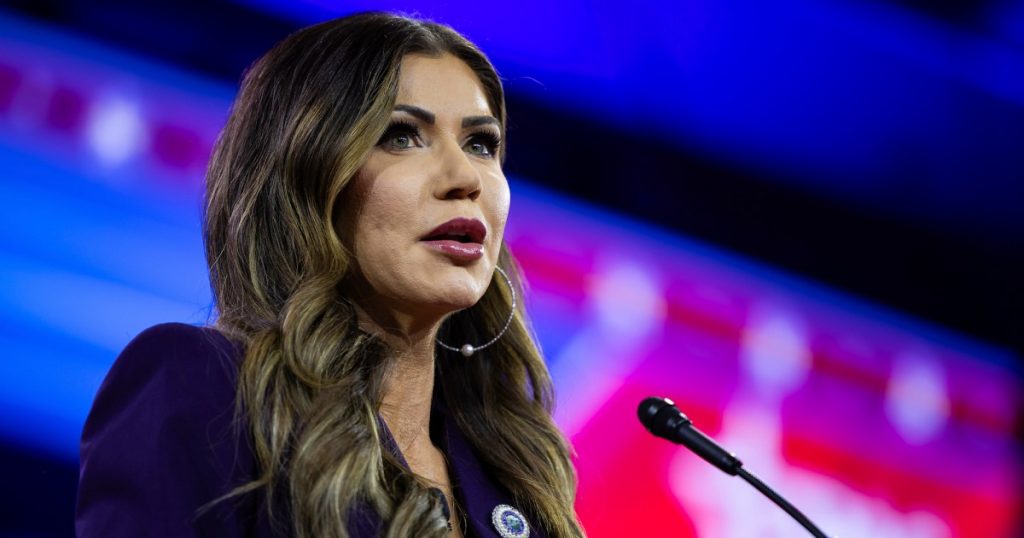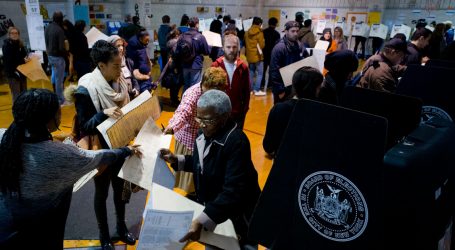The GOP Is Too Scared to Let South Dakota Vote on Abortion
South Dakota Gov. Kristi Noem speaks at this year’s Conservative Political Action Conference.Francis Chung/Politico/AP
Fight disinformation: Sign up for the free Mother Jones Daily newsletter and follow the news that matters.Since the Supreme Court overturned Roe v. Wade nearly two years ago, supporters of the right to choose have won every ballot initiative, in every state, in which an abortion-related measure has been put before voters. The trend is as true in red states like Kansas and Kentucky as it is in blue California and Vermont, and the in-between battlegrounds.
And so, as the 2024 election approaches, with reproductive rights activists pushing to get abortion-rights amendments on ballots in almost a dozen states, Republican politicians have been throwing spaghetti at the wall to find a way to stop them. The most recent example comes from South Dakota, where state law currently prohibits all abortions, except those needed to save a pregnant person’s life. There, a group called Dakotans for Health is collecting signatures to get a limited right to abortion enshrined in the state constitution.
As they’ve done in other states, Republicans are trying to stop the amendment from going before voters: On Friday, Republican Gov. Krisiti Noem signed a bill to allow people to revoke their signatures from ballot initiative petitions.
The campaign needs to collect 35,017 signatures by May 7 to qualify for the ballot. Dakotans for Health co-founder Rick Weiland says they’re already there, with 50,000 signatures in the bag. Based on history, the prognosis is good if the amendment does get to the ballot: South Dakota voters rejected abortion-ban measures in 2006 and 2008, long before the Supreme Court’s Dobbs decision sent support for abortion rights soaring.
To South Dakota’s anti-abortion Republicans, this an emergency. Literally: The new signature revocation law includes an emergency clause allowing it to take effect immediately. Under the new law, voters who want to revoke their signature from a ballot initiative petition have to send a notarized letter using registered mail to the secretary of state. The bill is transparently targeting the abortion-rights initiative. Its main sponsor, Republican Rep. Jon Hansen—who sits on the board of directors for South Dakota Right to Life—claimed to South Dakota Searchlight that people had been “misled, or frankly, fraudulently induced,” into signing Dakotans for Health’s abortion rights petition. “People have approached me and they said, ‘Hey, I signed that abortion petition because I thought it was pro-life. That’s what they led me to believe,’” Hansen alleged.
To be clear, the proposed abortion-rights amendment in South Dakota is weaksauce. It would prohibit the state from interfering in “a woman’s abortion decision and its effectuation” only in the first trimester. In the second trimester, it would allow state restrictions on abortion as long as they’re “reasonably related to the physical health of the pregnant woman.” And third-trimester abortions could be banned, unless they are necessary to save the the life of the parent. As a result, the regional affiliates of Planned Parenthood and the ACLU have declined to back Dakotans for Health’s campaign. “We don’t believe it will adequately reinstate the right to abortion in South Dakota,” Tim Stanley, vice president of public affairs of Planned Parenthood North Central States, to the told South Dakota Searchlight in December. (Prior to the Supreme Court’s decision, Planned Parenthood North Central States had been South Dakota’s only abortion provider—though it operated under such extreme restrictions that fewer than 200 abortions were provided in all of South Dakota in 2021.)
Those limitations haven’t stopped Hansen from insisting that the amendment is extreme, or from spreading misleading claims about what it would allow. Will South Dakotans believe him? Will those who signed the initiative petition revoke their signatures en masse? Weiland told the Associated Press he doesn’t think so.
“It’s pretty obvious that our legislature doesn’t respect the will of the voters,” he said, calling the new law “another desperate attempt to throw another hurdle, another roadblock” in the path of his group’s initiative.





